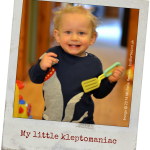Does your child cry when they poo?
Back in January I wrote a post about being sabotaged by poop. Yeah, it’s ok to chuckle. Just one of those not-quite-so-funny-at-the-time events that’s the norm here at Bod Towers with two under fives. Even I can chuckle about it now.
But read a little deeper and you’ll see a little baby boy that wasn’t laughing.
Little Man has had trouble ‘going’ for a while now and unfortunately this scene has been repeated a number of times. I think it started when he began solids, he certainly had no problem at all when we were breastfeeding. When I became ill and we had to move to formula feeding I was worried that it might cause him to become constipated but thankfully it didn’t.
I remember mentioning he was struggling with his poos to a health visitor and she said that it was common when babies started eating more solid food. Did she tell me to keep an eye on it? I don’t remember.
After a while he started taking himself off into corners to poo, his face beetroot red from straining. This progressed to crying and it didn’t feel right to me. Everyone said he’d grow out of it but when my Mother heard a feature by Dr Mark Porter about constipation in children on his Inside Health programme on Radio 4 it spurred me into action. I made an appointment for the same day with our doctor and Little Man was diagnosed with chronic idiopathic constipation.
Chronic idiopathic constipation – it sounds like such a big condition for such a little boy.
What it basically means is that there’s no medical reason why he’s constipated and it’s been going on for a long time.
It’s almost certainly psychcological.
Babies and children that have had one or more particularly unpleasant ‘experiences’ with going can start withholding their poos because they’re afraid it will hurt. Of course this just makes the problem worse as it builds up inside them and the whole process becomes a vicious circle.
In our case the treatment is laxatives to make it easier for Little Man to go. The first medicine we tried, called LACTULOSE, did precisely nothing so we moved onto the stronger MOVICOL which certainly works, although I’m not having to stand behind a protective shield or anything. It’s just helping him to go without straining. I often don’t even notice when he’s gone now until, you know, I know *holds nose*.
He’s taking two sachets a day at the moment, prepared with water and mixed into his milk (you can mix it with squash too but he refused to drink it like that) and I’ve been advised that he may need to continue taking it for a few months. The important thing is for ‘going’ pain-free to become normal again so that he doesn’t associate the feeling of wanting to go with pain or fear. Then we can reduce the dose to once a day and slowly wean him off altogether.
They key word here is slowly. Our treatment isn’t going to be short term but some children have to continue treatment for years.
Idiopathic constipation is actually more common than you’d think, according to NICE (the National Institute for Health and Care Excellence) as many as 30% of the child population in the UK may be affected at some time, and if it’s left untreated it can lead to quite serious problems as they get older. One of the major difficulties is recognising the condition. Often children who have idiopathic constipation can still soil their nappies or clothes as it ‘leaks’ around the poo that they’re trying so hard not to pass. So you think they’re going when they’re not.
One organisation that I turned to for information was ERIC (Education and Resources for Improving Childhood Continence). ERIC is the only UK charity dedicated to improving the lives of children and young people with ongoing continence problems. There is a wealth of resources on their website and a helpline that worried parents can call for advice.
Brenda Cheer, the ERIC Nurse, gave me this comment:
“Many parents are simply unaware of the symptoms of constipation, such as soiling, and often think their child is being lazy. Early intervention for constipation is crucial as the earlier the signs and symptoms are recognised the easier it is to resolve the problem. The effects of unrecognised or inadequately treated constipation in children can include significant abdominal pain, fecal incontinence, appetite suppression and low self-esteem. Constipation also has an effect on the bladder and may jeopardise attempts to potty train or, later on, to get dry at night.
The long-term impact for the whole family can include social isolation, disruption to family life and feelings of frustration and despair.
Raising awareness will also help overcome the stigma surrounding this difficult and frustrating problem. Because it isn’t generally talked about, many parents just aren’t fully aware of what’s ‘normal’, and so it is very hard for them to spot the early signs.”
I’m so glad that I asked for help when I did. Little Man has stopped crying when he goes and I’m hopeful that this won’t have a lasting impact on him.
Because I don’t want to see that beetroot red, straining, crying face again.
Does your child cry when they poo? Listen to the Radio 4 programme that convinced me to look for treatment, visit ERIC.org for useful information or speak to your GP.



 7 things I wish I’d known about toddler boys before I had one
7 things I wish I’d known about toddler boys before I had one
 Feeling empty before World Breastfeeding Week
Feeling empty before World Breastfeeding Week





It WAS excellent wasn’t it. Radio 4 rocks.
Oh hun I didn’t realise you’d gone through this too. It’s so horrible isn’t it. This weekend I’ve reduced down to one dose of the laxative so we’ll see how that goes. Good idea to keep some on hand – I’ll remember that! x
I heard that programme too – I thought it was excellent.
What a horrid experience for him… Little A went through a big period of withholding after a particular poo that hurt – it was horrid to see her go through this; so we used laxatives too, and they really helped her – now she is absolutely fine (although I like to keep some laxative on hand just in case). And like you said, we went through a vicious cycle as well! X
Thank you honey x
Hi Esther I’m so glad you found it useful – it’s so important to raise awareness of this because I’m sure there are many other parents in the same position! Definitely worth checking out with your GP. Thanks so much for commenting.
Thank you so much for this article. My daughter has always had problems going and potty training was a nightmare. She frequently has accidents (which leads to much frustration!) and I am wondering if she still suffers with this condition which I never knew about before I read this!
Bless that sounds so difficult for you both. Really feel for you all. I’m glad to hear you are getting help and hopefully things will keep getting better. It’s interesting that there is things you can do. xx
Thanks lovely, it has been distressing and made worse by me not realising what was really going on. Thankfully he’s getting the help he needs – it’s such an important issue and I really want to raise awareness about it. x
Oh, bless him! And you. That must be so difficult, when you see him in pain and can’t do much. Glad you’re getting some help and advice now though x x